The Heartbreaking Story Of A Man And His '68 Camaro
It took more than 50 years for Steven Weber's father to tell his son he loved him. By the time he said the words, Steven's father was overcome with dementia, living out his final days wheelchair-bound. Yet Steven's father is the reason he bought the '68 Camaro back in 1973. It's the reason he's held onto it all these years. And it's one of the reasons it will be such a momentous occasion when he passes it on to his son, which will be soon—perhaps sooner than Steven had expected.
For 44 years, that car has been not only a constant companion, but a common thread in a family plagued with one tragedy after another, and something that has also connected three generations of men.
There was the crash that broke Steven's skull and put him into a nearly week-long coma. There was the head-on collision that killed his teenage stepdaughter. So much had gone wrong.
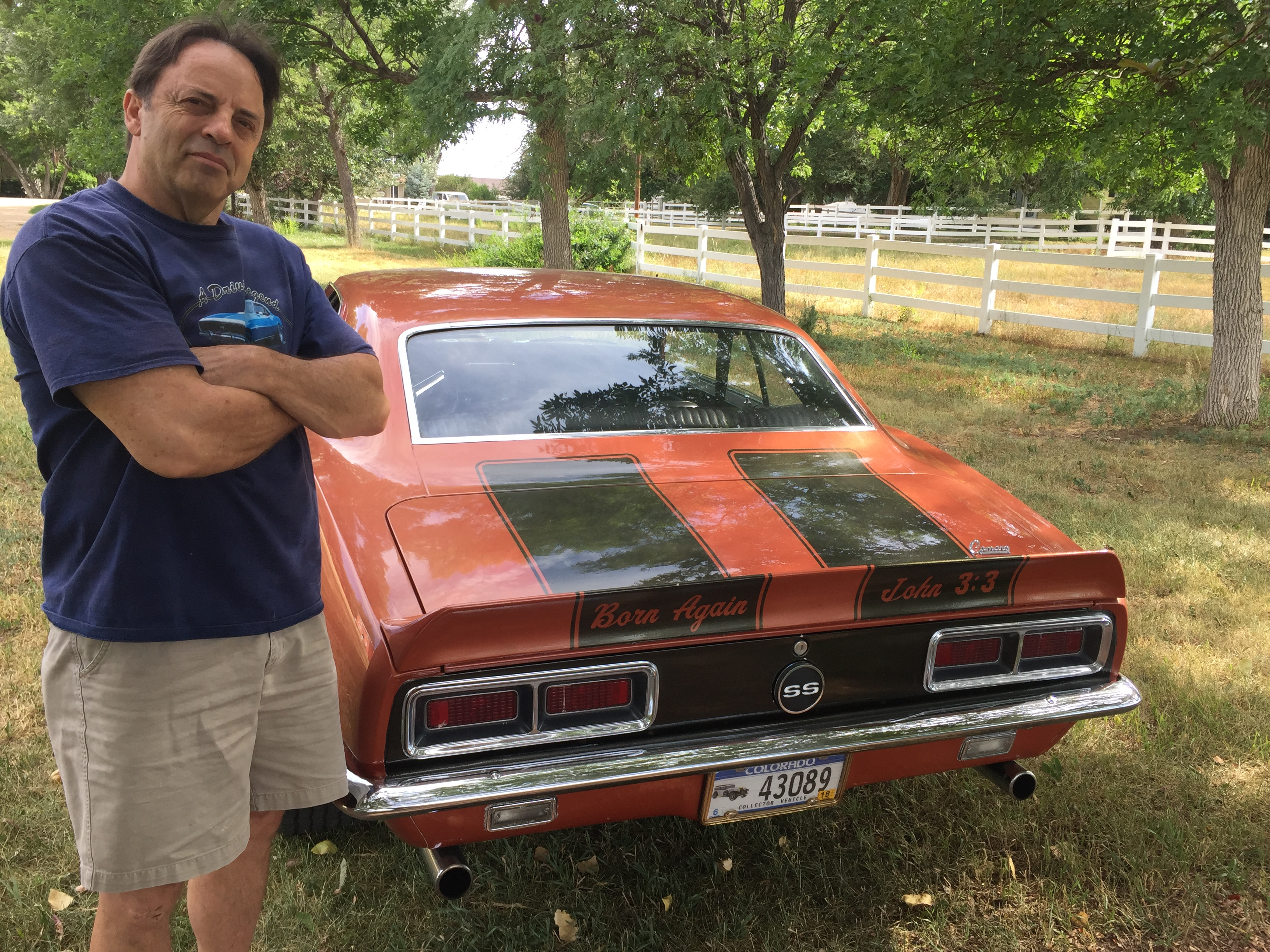
When I talked to Steven about all this I struggled to find the words, a way to ask him something that had been nagging at me. "You're a car guy... How do you deal with cars being a bad thing," even if they've also been what he calls "a wonderful thing."
"That's a pretty good question," he says. "I like how you phrased that, because it is both. The same thing you admire and enjoy working on and driving and looking at is the same thing people die in."
He ponders the question some more then tries for an answer. "Cars didn't cause the accidents. It's the people behind the wheel," he says. "It's just the way of life. It's just the way things happen."
Then he comes to an ever simpler conclusion. "I like cars," he says. "I've liked them since I was 14 and my sister got a '64 Mustang and I got my first ride in it and to this day, I can look back and see that shifter in the middle of the column... I can still remember her letting me shift it," he recalls. "She was 16 and I was 14. It was a '64 Mustang. Never forget it. And to this day I remember that. And that's when I started my appreciation of cars."
As he's saying this, he comes to a fresh realization. "Here we are again, talking about our connections. We're talking about my son, the Camaro, my dad. And now I'm looking back, and I just realized, my sister's connection."
His sister, Denise, was murdered in 1992 by her abusive ex-husband. Their five-year old son, oblivious in the moment as to what was happening, waited in the driveway in his father's Chevy Blazer. Her husband dropped their son off at the babysitter's house before he drove into the wilderness and shot himself in the chest.
This is the hot-rodding and heartbreaking life of Steven Weber, and his 1968 Camaro, his constant companion for 44 years and counting.
These days Steven spends a lot of time playing with his grandkids, and weeding in the small but lush garden in the front yard of the house he shares with his wife Cecelia. He's usually wearing athletic shorts and a t-shirt adorned with the image of a classic Chevy. He's months away from his 60th birthday, and his hair is significantly thinned, but still dark. His forearms and biceps are still pronounced from his days working on the family farm, then boxing in the Air Force, and now just being a guy who makes time to go the gym regularly.
But in 1973, 16-year old Steven Weber was working at a gas station in Longmont, Colorado. He was in the market for a vehicle, and had his eye on something special. "It was a '68 GTO. A Goat... it was a nice car, and I really wanted that one," then he adds for emphasis, "that's what I wanted."
The Goat was $1,800, or about $10,300, in today's dollars. Steven didn't have the cash for it, so he planned on taking out a loan. But before he could, something happened at work. "All of a sudden out of the blue, this Camaro comes driving into the islands. And I look over, and it seemed so weird, so out of place...my dad was behind the wheel. And my dad never showed interest in cars."
He asked his father what he was doing with a Camaro. Steven's father told him that he saw it was for sale. "I thought I'd drive it over and see if you wanted this," Steven remembers his father telling him.
Steven told his dad he already had his eye on a GTO. His father told him, "Well, this is $1,200."
Six-hundred bucks was a lot in those days. Especially to a teenager. So, there on the spot, he decided to go for the Camaro. Not that it was an easy decision. "I liked the Camaro, but I really liked the Goat."
But it wasn't just the price tag that changed Steven's mind—it was his dad.
His dad, who had 14 siblings, and who was the son of Prussian immigrants who settled in eastern Colorado. Steven's father served in the Army, and then met his wife, Steven's mother, and resettled near Longmont, where he worked as a mail carrier, and as a farmer. A physically strong man, Steven says his father was reserved and "didn't have a lot of time for nonsense."
But he made the time when he spotted the '68 Camaro. And the significance of that wasn't lost on Steven.
"I thought, man, this is kinda cool, my dad brought this car in here. It was just kind of out of the ordinary 'cause I never really had a connection with my dad growing up... We just never connected too much in terms of having a close relationship. So when he did that, it was his way of reaching out to me, and I just kinda took the Camaro."
To be clear here, Steven—not his father—bought it. Steven not only bought it, he took out a loan to buy it. All Steven's father did was point it out to him. But to Steven, that didn't matter. His father had noticed him.
By then the car had already been through a rough five years. "Whoever bought it before I did really must have rodded the heck out of it, because it had 72,000 miles on it and the motor was blown." The previous owner replaced the engine with a 327, which was then standard with the RS variants.
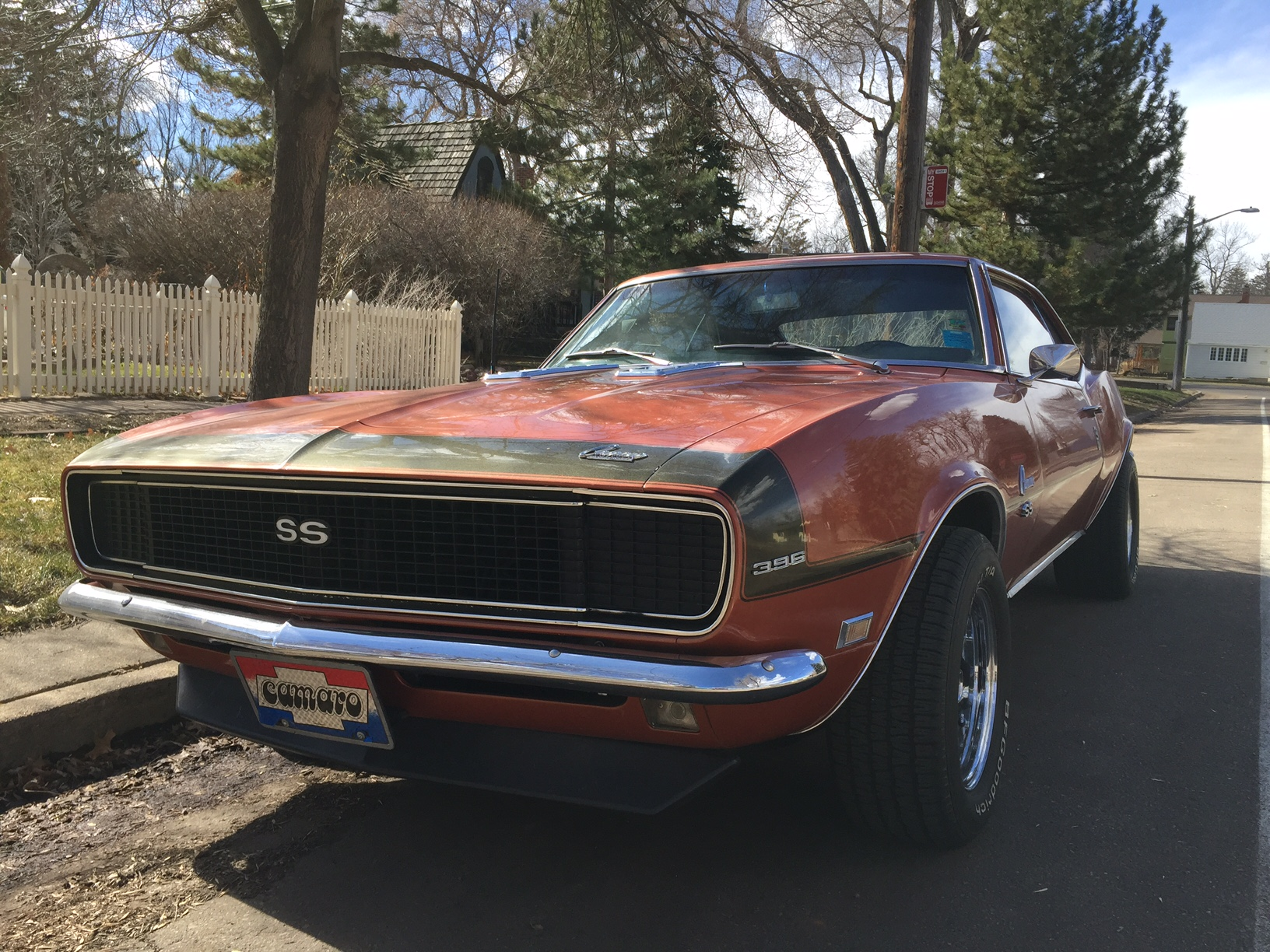
Steven had no idea his Camaro had actually started life as an RS/SS with a 396. He only knew that it was a sweet-looking car that was six hundred bucks less than the "Goat" he'd been looking at. But the more he drove it, the more interested he got in the car's provenance. So, he reached out to a buddy who was familiar with Camaros, and they took a look at the numbers on the radiator. Together, they solved the mystery.
"It was a little bit of a rarer car than I had originally thought. It was a 396 SS/RS four-on-the-floor, bench seat, and a bronze paint job," he says proudly, noting it rolled out of the factory with 375 horsepower.
He decided then that he wanted to restore the car to its former glory. And over the next four-plus decades, he did just that. But there was a lot happened during that time.
In high school, Steven was a troublemaker. He says he was "rowdy" and was caught stealing things from his school.
And then there was his father. I asked Steven what he looked like. He thinks about it, and he says, "Well, he looked just like me." And then he tells me how when he was growing up on the family farm, he and his siblings never told him they were bored, because he'd respond by putting them to work on hard physical labor. But most of all, he remembers this: "My father never told me he loved me. I don't even think he hugged me," Steven says.
So, Steven joined the Air Force. "I got in the service basically to grow up, get out of town, get away from my family a little bit."
He spent four years mostly at Strategic Air Command in the northern half of North Dakota, where the average January high temperature is a balmy 18.6 degrees. He boxed and earned the nickname "30 Seconds" because of his performance in a televised Air Force match.
"I lasted 30 seconds. Next thing I know, I'm getting up, I hear boos, but I get up, and I say, 'I wasn't that bad. I'm ready to go, I wasn't that bad!' The [referee] says, 'Son, I can't let you go!' I says, 'Why?' He says, 'I've already counted you out!' I says, 'It's been that long?!' I says, 'Wow!'"
He'd been assuming his Camaro was just sitting there in storage on his family's property in Longmont. But as it turns out, while he was getting worked over in the ring, the Camaro was getting a bit of a workout of its own.
Steven smiles as he tells me, "I remember getting letters from my buddies at home, and they'd say, 'I think we saw your dad in the Camaro draggin' Main!' And I would laugh and think, naw, naw he wouldn't do that, would he? But they'd say, 'yeah, we saw the Camaro!' So I came home on leave, and I said, 'Dad, did you get the Camaro out?' And he goes, 'Oh, I drove it a little bit...' And I said, 'Oh that's cool, Dad, I didn't know you liked cars."
Steven had been desperate for a connection to his father. And as it turns out, there might have been one all along, but Steven's father simply hardly acknowledged it.
In 1980, Steven left the Air Force and returned to Longmont, and his Camaro. Less than a year after that, Steven was in a car crash that would dramatically change his life.
He was driving his '52 Chevy pickup. He'd stopped at an intersection with a flashing red light. "And this car to the right of me, this van, pulled in and blocked my north view, so I couldn't see," Steven recalls. "I look over, and he's going like this, waving me through, so I didn't think anything—I just went through. That's the last I remember. They say I got hit by two cars, and I flew out of the truck. People said I was just flying in mid-air, and I landed 20, 30 feet away from the truck on the back of my head, on the pavement, bouncing off. I didn't know what happened. I just know that I woke up in the hospital four or five days later."
He suffered a massive closed-head injury and was diagnosed with post-concussion syndrome. "They think all my head injuries are causing a lot of my problems," Steven tells me, sadly.
Problems he deals with today, 37 years later, that get worse and worse as each year passes.
"I'm on medication. It's been two and a half year since I've been struggling with," here he struggles to say the word then finally gets it, "cognitive decisions." Then he rattles off the things he's being treated for. "Cognitive, memory, depression."
The car accident is just one of what he refers to as his "trials." Not quick to play the victim, he says, "I think everybody could sit here in this chair and tell you of things in their own life. Everyone's gone through trials. I probably haven't been through any more than anyone else." He was bullied. Got kicked so hard in the face, he bit off part of his own tongue. So then he had a speech impediment. And a stutter. He had learning disabilities, and the issues with his dad.
And then he says there were some other things later on. He says they're "just some things you go through," which is an understatement considering what he says next: "Like my sister getting murdered in 1992. That pops out...Then it wasn't even two years later when my wife's daughter, my step-daughter, was killed in a car accident at 18."
"So we went through that," he says flatly, like he's trying to keep it together, then adds, understandably, "I've been in and out of depression since '92."
He hides the depression. I've lived across the street from him for six years, and until now, our interactions have all been ones marked with hearty laughter, chops busting, and, of course, the Camaro.
For six years now, whenever he gets the Camaro out, I like to say, "Hey, how's my car doin'?" And Steven always says things like, "Yeah, I'm keepin' it runnin' real nice for you!"
The truth is, he is keeping it running nice for someone: his son, Aaron, who he calls "Champ." They had a much closer relationship than Steven had with his father, and Steven was careful to not repeat his father's mistakes with his kids.
"I wish that my dad could have allowed us to have that more, and we would have connected more. So I wanted to do whatever I could to have that bond with my son and my daughter."
The Camaro was a source of a bond between them, but a disagreement too.
"He was about to go into the service, he thought I was supposed to give it to him then, after high school. I said, 'Why would I do that?' I said, 'I wanted you to have an incentive to go to college.'"
In Steven's mind, it was a long-standing agreement, and he had evidence to back it up. "I had to actually pull out a video of when he was four years old when he was behind the wheel, and I was filming him....And I said, 'Champ, when are you gonna get that car?' And he goes, 'When I go to college!' And I said, 'That's right!'"
Steven's son chose a different path. "He ended up joining the Air Force and being a firefighter, and he's done real well," Steven says. He said he came to realize college isn't the right thing for everyone.
So for now, the Camaro is still Steven's. But Steven is not ambiguous about it. "It's gonna be his."
It's gonna be his. That's what he was thinking when he decided it was time to repaint the car. Regretting the lack of any bond he had his with his own father, Steven decided "it would be a good father-son project."
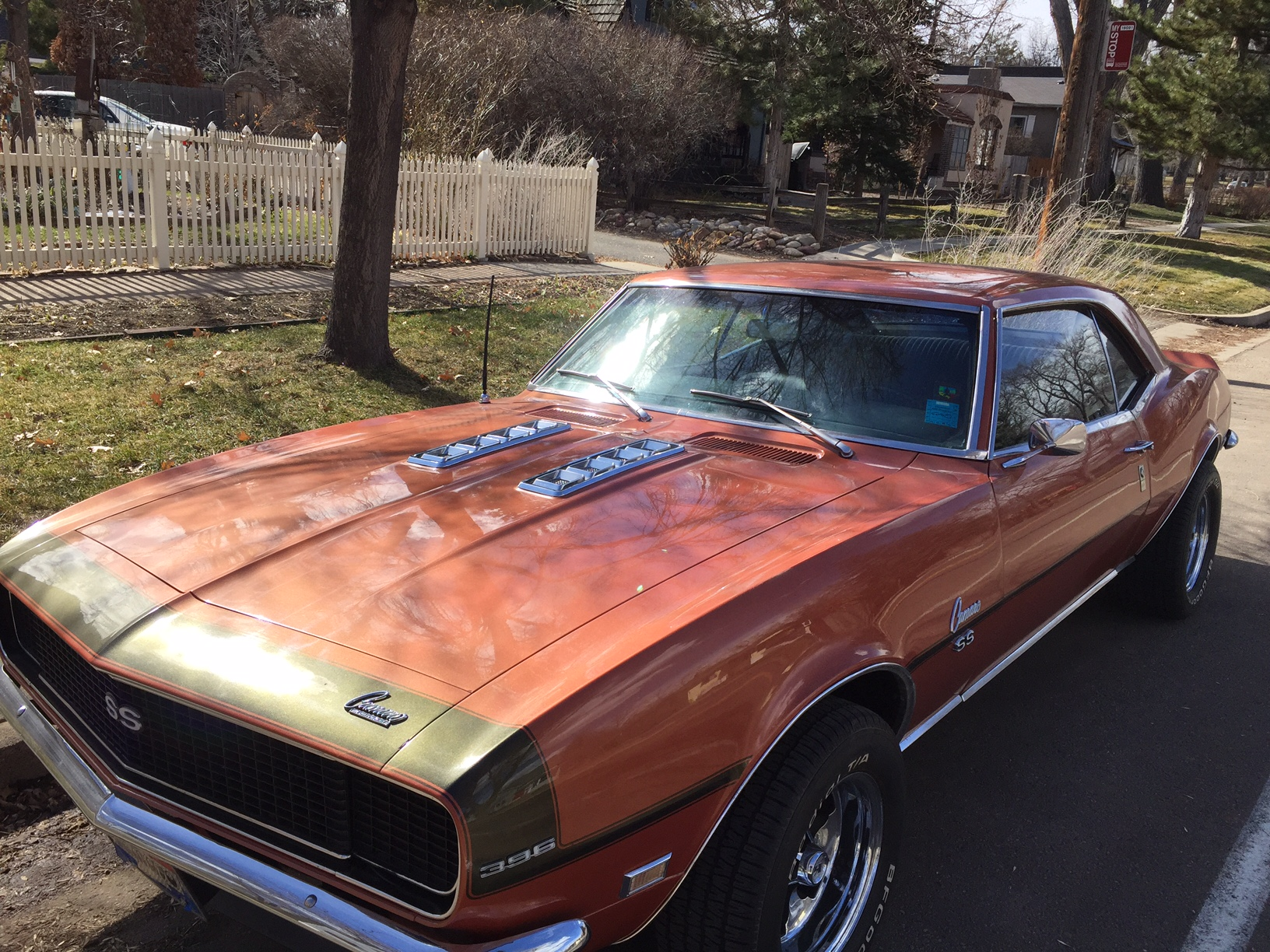
"I called my son," Steven remembers. "I said, 'Aaron, this is gonna be [our] project. It's gonna be your car someday, so you might as well get in there and help me.' So he started helping me a little bit. But the further I got into it, the further he got. He had other interests in school, like swimming. He just really wasn't into it as much. I was hoping he would be, but he wasn't. I understood that. So I just kept working... I just ended up doing it."
He worked every single day for three months that summer. And finally, as September rolled around, he was no longer out there by himself. "The closer I got to getting it done, my son came into the picture again, because he saw it coming together. So he was there to help there toward the end. And I got a picture of him putting stuff back on. And he was excited now."
When I asked him about repainting the car, I wasn't expecting to hear a father-son story. He had told me it was a funny story, a crazy story. So I nudge him on that, and starts chuckling. Then he tells me.
Rather than sand the Camaro by hand, he thought he'd take it to a media-blasting shop who could take it down to the metal without any risk of doing damage to the body. So, he stripped the hardware off the car, tied the hood down with a bungee cord, and went on his way. It should have been a routine drive down to Denver, no more than 45 minutes. His wife followed behind him so she could drive him back to Longmont after he dropped the car off.
But then something happened on a bridge over the St. Vrain River. "The wind caught the hood and blew it clear back over me, and I couldn't even see 'cause the hood's up, and I didn't know where I was driving," he tells me. "I was panicking, I was sliding, I was going to the right, but I didn't want to hit the guardrail, and I pulled over, and I just said, 'My goodness! What happened?'"
Steven assessed the damage. "It bent the hood hinges, my nice chrome springs that I had ended up laying in the river. And I just said, man this isn't gonna work out." He tied the hood back down, and drove it back to Longmont, where he was renting garage space. "I decided, 'Okay! I'm gonna do it myself. I'll just start right here.' So I just proceeded to take the car apart...I didn't know any better, but I just started taking a sander and taking all the paint off.'"
I'm shaking my head in wonder. Not just because I'm imagining the scene. But because I'm wondering if anything can go right for the guy.
It's like he can read my mind. He lowers his voice, and he tells me this solemnly, but proudly. "If you look at the car, it's not a professional job by no means. But it worked out to where I said, it's only the second paint job I ever did. It's something I did with my son. It's something I got from my dad, and now I'm doing it with my son."
"So, you know what?" he says, truly content, "It's all good."
It is all good. The paint, I mean. It's excellent. He's modest about his execution and the results; but it hardly looks like a DIY job. There is one "tell," though, that it didn't come from a factory. It's a bit of a personal touch.
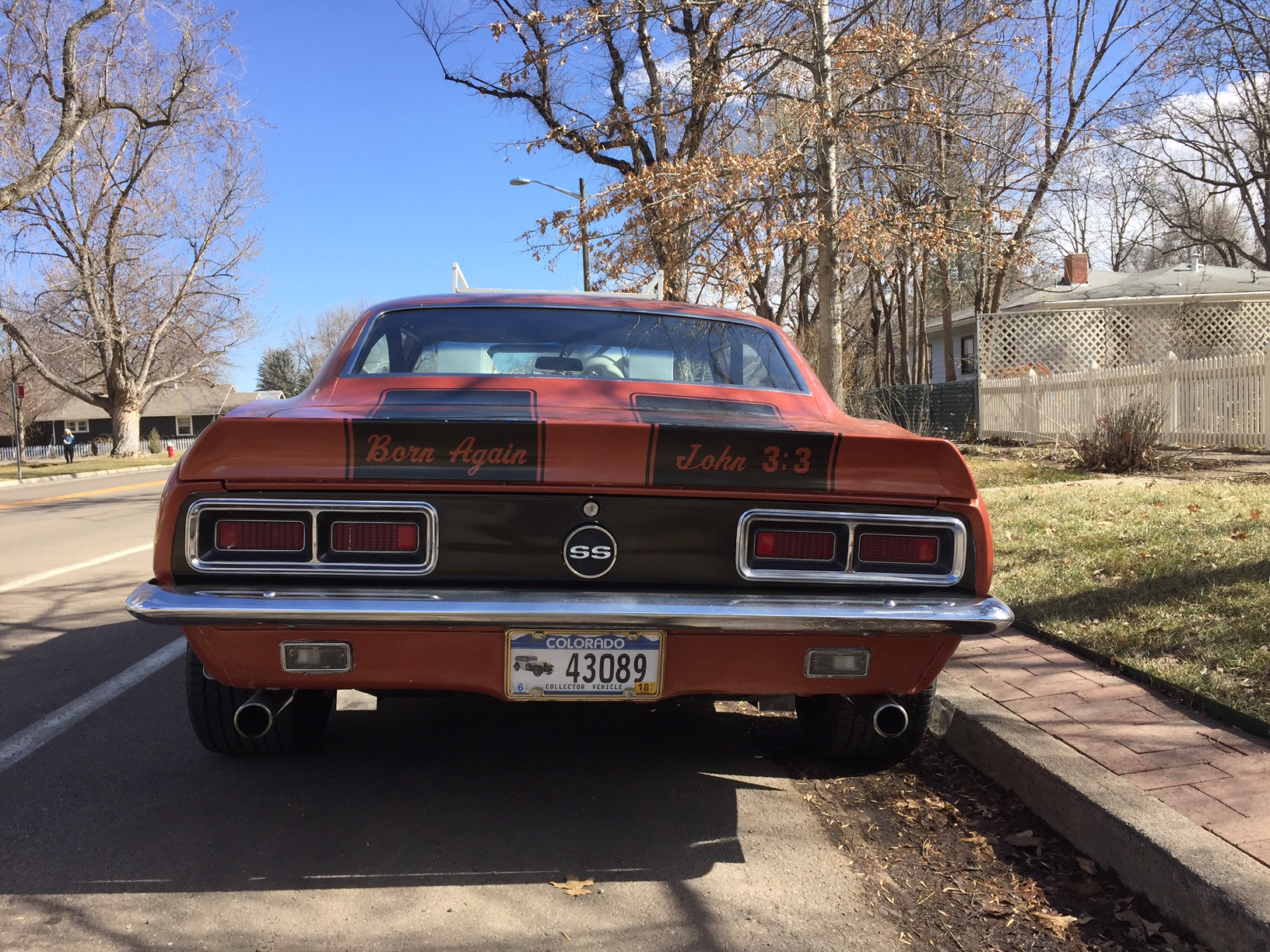
"On the spoiler, I painted 'Born Again John 3:3.' That's a scripture that's important to me because I'm born again. And I was painting my car, and I thought, you know, this car's kinda getting reborn here. So I just put that, my favorite scripture, on there."
I tell him I don't know much about Bible verses. "It's basically, you gotta be born again if you want to go to heaven," he summarizes it.
He says that throughout much of his life, he was only religious enough to say he believed in God. Otherwise, he'd make excuses when he'd be invited to church activities. His first marriage didn't work, Steven says, because they were "too young." And after the divorce, Steven said he became "a womanizer." He adds, "I was angry. I was bitter. About a whole lot of stuff."
And then in 1986, Steven says, "I decided, you know, I wanted to make a change. God had been pulling at my heart, so I decided to go back to church again."
It was there at church, where he met his current wife, Cecilia. In 1987, Steven says, "I gave myself to the Lord. I recommitted myself and got baptized. I decided to turn around and go the other way; to go towards God. And I haven't looked back."
That hasn't necessarily made things go any easier, any more smoothly in his life. His sister's murder, his stepdaughter's death, for instance, are things that happened after his baptism. "It's not that I haven't had trials in my life since then," Steven says. He goes a step further: "It's not that I haven't been mad at God at times. Things have happened in my life since I got saved."
And then he sums it up like this: "Life is joy. I attribute that to my faith in God because I realize I'll see my sister again."
His sister. The person who introduced him to cars, who let him shift her Mustang, which made him fall in love with cars when he was a rowdy teenager.
He tells me that over and over again: "If you ever see American Graffiti, that was Longmont." He tells me about the old days. I ask him if maybe he'll tell me some stories while we take a ride in the Camaro. He enthusiastically agrees.
Back in the day, my own father-in-law, Dan, had a 1968 Camaro, too. Not an RS/SS, but an RS with a 327. Dan lives here in town, and Steven tells me I can bring him along for the ride. I give Dan the front passenger seat.
Steven makes a left onto a main thoroughfare. Without warning, he dumps the clutch, and the big block roars, and it feels like the car might actually launch into the sky like a bottle rocket. Instead, it fishtails for a moment before the tires find purchase, and it surges straight ahead, full power. Steven and Dan don't even know each other, but they're hollering with excitement like old friends.
Steven doesn't want to brag. "Dan's would've beat mine," he says. "Even if I beat him out of the hole, he'd beat me once he got up to the higher Rs."
I ask Steven if he ever got beat back back in the old days, and he starts laughing almost immediately.
"One night, we had a new guy come into town," Steven tells us, "This guy has a car, and I remember lookin' at it with my buddies and kinda laughing. It was older. Like a '41 Ford or something. It was like an old jalopy.
It sounded alright, but on the side, I'll never forget it, on the side it said 'D dash Con.' D-CON. I'm thinkin' 'D-CON? What's wrong with this guy? D-CON?'" Feeling like this would be an easy race, Steven challenged him, and D-CON accepted.
"He just cleaned my clock, man. That guy had a motor in that thing..." And then he gets to the punchline: "You know what D-CON means? That's a rat killer. Well, he was a rat killer! I was a Chevy. I was the rat. That's what they called the big blocks: 'the rat!' So D-CON was a rat killer, and he killed me!"
I ask them what it was like to get beat on the strip. Did it hurt? Was there a lot of trash-talking? They let out a chorus of "oh no"s, and Steven tells me, "I'd get beat, and we'd laugh, shake hands. We had a good time. Might've even had a beer together."
Plus, Dan adds, "you didn't have any money to bet on anything."
"There was no title-for-title," Steven is quick to add. "I don't know where they got that in the movies."
"You invested pretty much everything in the car," Dan says. "I worked at a gas station next to the A&W. And shit, I think it was under two dollars an hour. Maybe a $1.75 an hour. So you put in every nickel you scraped together into that car. And your buddies? If they're gonna ride around, they better chip in for gas, too. You need a quarter or fifty cents or a buck or whatever for gas."
A few weeks later, I bring that story up to Steven, and he asks, "Oh, did I tell you that one?" And then he says that "because of my mental issues, I don't know how long I'll be able to remember those stories. And I want to be able to remember those stories and enjoy them while I can."
"You don't know what's going to happen in the future," Steven says. "By next year, I might not have any memory at all." Steven looks at the ground and says, "It's discouraging, it really is." I ask him if I can quote him on that, and he says, "Yeah, sure. I mean, I don't even know what I just said."
I try to lighten the mood and I say to him, "You're going to read this article and think, 'Who is this guy, and how does he know about my Camaro?'" Steven breaks into his raucous laugh and says, "That's a good one!"
But, it's obviously not a funny situation. We drink a beer on my porch, and he tells me how he flunked his electrician's license test three years ago. Pardon the pun, but I'm shocked. I figured he had just retired. Starting in the 90s, Steven built a well-respected business as an electrician in Longmont. When I moved to town six years ago, he was the guy everyone recommended. He had such a knack and knowledge for it, he frequently helped tutor younger, aspiring electricians when they studied for their licenses.
And then he took the test (which is required every three years), and he says, as if he's still baffled by it all, "I couldn't even think how a circuit worked."
Now, Steven does brain-game type puzzles to keep his mind sharp. Neighbors still ask him to do electrical jobs, but he politely turns them down, not wanting to put anyone at risk.
"It's hard," Steven says, "to not be able to work on the cars like I used to, to not be able to fix things. It's hard."
I ask him if his issues have started to interfere with his ability to drive. "Not yet, thank God," he says. But they will. "Yep. I don't even want to think about it. I'll get emotional about it." But I can see, he already is.
Steven's not the first in his family to suffer from these kind of problems. His father experienced severe neurological issues before he died. In the beginning, they only exacerbated an already difficult relationship. "He disowned all of us," he explains, "all of his children except our youngest sister. He wouldn't have anything to do with anyone else. All the anger, all the bitterness, how he lashed out at us," and he adds that his father, "wouldn't get help, because he thought people were trying to poison him."
Then, something happened. As his father's condition worsened, Steven says, "I had a chance to connect with him and took care of him in the last year, year-and-a-half of his life," Steven remembers.
He wants me to understand how real this struggle was, how unlikely the redemption turned out to be. "I need to share this because it's important," he tells me emphatically. "When my sister died, we were at the house and everyone was there and we were hugging each other, and I'm hugging my dad, and I hugged that man, and he hugged me. And as he was hugging me, I remember thinking to myself, 'this is the first time he's ever hugged me,' to put his arms around me like that. And I didn't want to let go. Then all of a sudden, it was like turning a switch off. He pushed me away. He was done. And I'll never forget that. I thought, man, what is going on with this man? He can't hold on, he has no emotions. I've never seen the guy cry, even when his mom died...What is it about him? I can't get in his heart."
He continues, "And so when he got sick...and I'd lift him out of that wheelchair, and I'd look at his face, and he'd be crying, and he'd be looking at me, and he couldn't even talk...I just connected to him where something inside of him started breaking—something in there, [which let out] all the softness he'd been holding inside of him all those years...I'll never forget it."
Finally, Steven heard the words he'd been wanting to hear his whole life. "In the end, I would say, 'I love you, dad.' And he would say, 'I love you.' And he would have tears in his eyes when he did it."
I ask him if his dad still knew about the Camaro in the end. He says he did, and they'd reminisce about it often.
"Oh, he'd get a kick out of it. We'd get a kick out of it when we'd talk about it. I'd say, 'Remember, dad, when I was in the service, and I heard from my friends you were cruisin' Main in it?' And he'd laugh."
Speaking of cruising Main, I wondered: did he give his father any last rides in the Camaro? "You know, I don't think I did... I wish I would have. I wish I would have put him in that car and gave him a ride in it. That would have been a great way to finish off our memory with that," he says.
But he made sure his father knew the importance of it all. "I'd always remind him, I'd say, 'Dad, I wouldn't have had that car if it wasn't for you.' And I think he appreciated that."
It's been 44 years since Steven's father drove that '68 Camaro into the islands. He's kept the miles pretty low. He also replaced the 327 with a GM 396 CE replacement block. The car has a lot of time ahead of it.
But how much of that time is left with Steven is not so clear. "I think the transition's going to have to take place. My son doesn't have a garage right now. He wants to get to the point where he can build a garage on his property... Basically, if he had a garage now, it would probably be a transition time."
Then he looks at me and he tells me very seriously: "It has to be the right time, though. I want to pass it on to where he understands the meaning. And I think he does. It's the importance of it. It's just a car, but it's a connection. It's a connection that's brought a family together in place of maybe some of other things that just couldn't have. It's the way it fits into our family."
And then he adds, "But it'll probably be sooner than later."
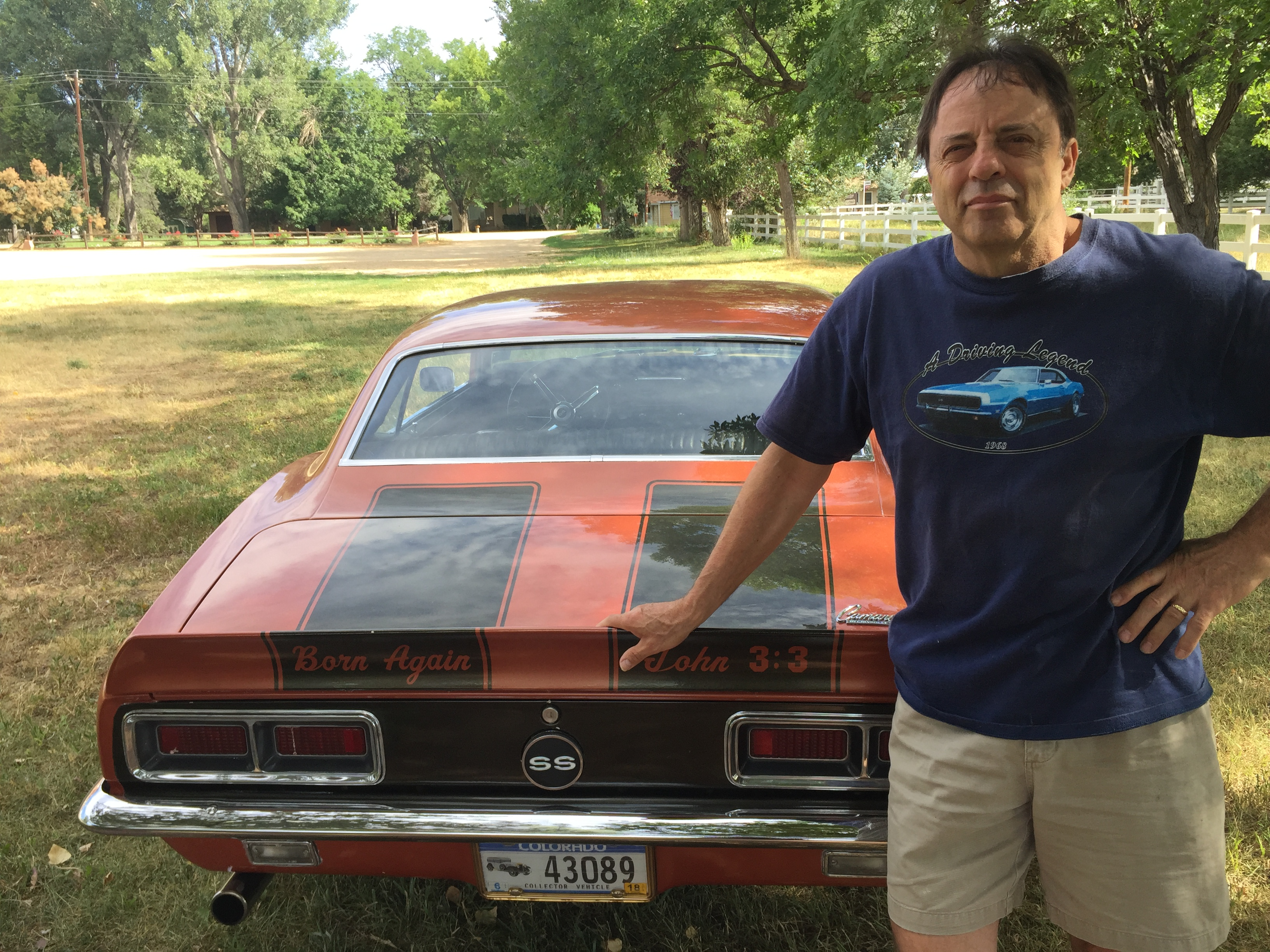
David Obuchowski's essays and features have appeared in The Awl, Gawker, Deadspin, and the Daily Beast. He plays music, too.
